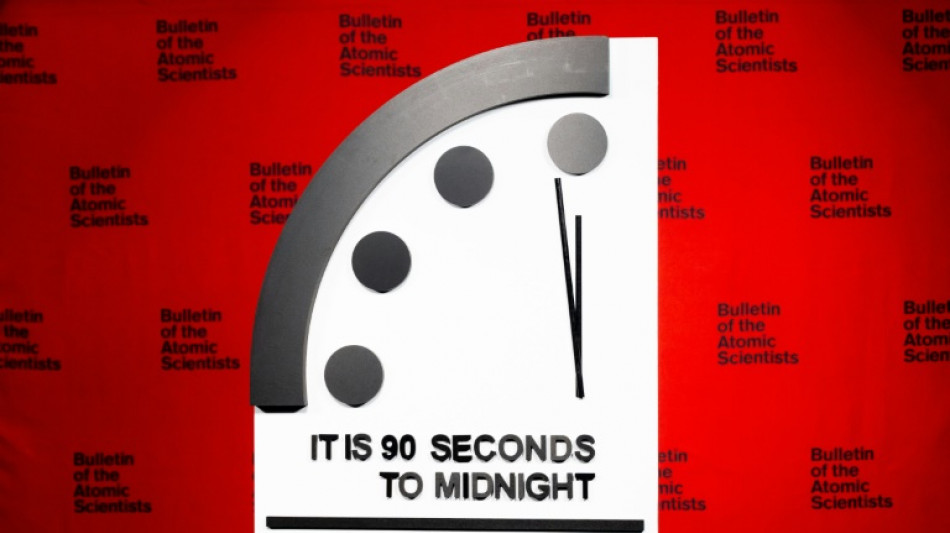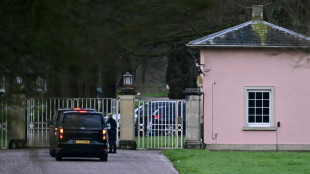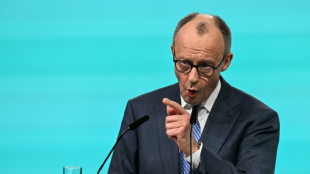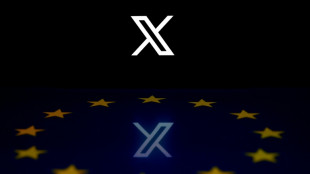
-
 Scotland captain Tuipulotu grateful for Wales boss Tandy's influence
Scotland captain Tuipulotu grateful for Wales boss Tandy's influence
-
Zelensky says no 'family day' in rare personal interview to AFP

-
 Zelensky tells AFP that Ukraine is not losing the war
Zelensky tells AFP that Ukraine is not losing the war
-
Sweden to play Switzerland in Olympic women's curling final

-
 Counting the cost: Minnesota reels after anti-migrant 'occupation'
Counting the cost: Minnesota reels after anti-migrant 'occupation'
-
UK police probe Andrew's protection as royals reel from ex-prince's arrest

-
 Doris says Ireland must pile pressure on England rising star Pollock
Doris says Ireland must pile pressure on England rising star Pollock
-
US military assets in the Middle East

-
 Neymar hints at possible retirement after World Cup
Neymar hints at possible retirement after World Cup
-
Stocks rise after court ruling against US tariffs

-
 Australia end dismal T20 World Cup by thrashing Oman
Australia end dismal T20 World Cup by thrashing Oman
-
Olympics chief says Milan-Cortina has set new path for Games

-
 Russian SVR spy agency took over Wagner 'influence' ops in Africa: report
Russian SVR spy agency took over Wagner 'influence' ops in Africa: report
-
Pegula fights back to sink Anisimova and reach Dubai final

-
 Trump administration denounces 'terrorism' in France after activist's killing
Trump administration denounces 'terrorism' in France after activist's killing
-
Colombia's Medellin builds mega-prison inspired by El Salvador's CECOT

-
 German broadcaster recalls correspondent over AI-generated images
German broadcaster recalls correspondent over AI-generated images
-
US Supreme Court strikes down swath of Trump global tariffs

-
 England's Itoje says managing 'emotional turmoil' key to 100 cap landmark
England's Itoje says managing 'emotional turmoil' key to 100 cap landmark
-
Trump says weighing strike on Iran as Tehran says draft deal coming soon

-
 Tudor is '100 percent' certain of saving Spurs from relegation
Tudor is '100 percent' certain of saving Spurs from relegation
-
Azam dropped for scoring too slowly, says Pakistan coach Hesson

-
 Stocks volatile after soft US growth data, court ruling against tariffs
Stocks volatile after soft US growth data, court ruling against tariffs
-
Italy bring back Capuozzo for France Six Nations trip

-
 From Malinin's collapse to Liu's triumph: Top Olympic figure skating moments
From Malinin's collapse to Liu's triumph: Top Olympic figure skating moments
-
Arteta urges Arsenal to 'write own destiny' after title wobble

-
 Ukraine Paralympics team to boycott opening ceremony over Russian flag decision
Ukraine Paralympics team to boycott opening ceremony over Russian flag decision
-
Wales captain Lake wants fans to bring 'noise' against Scotland

-
 Skier Vonn's Italian hospital a hotbed of men, sister says
Skier Vonn's Italian hospital a hotbed of men, sister says
-
India target S.Africa top order, Abhishek to come good: bowling coach

-
 Carrick praises Man Utd 'diversity' after Ratcliffe's immigrant rant
Carrick praises Man Utd 'diversity' after Ratcliffe's immigrant rant
-
I never thought it would be hit, says 'Scream' creator 30 years later

-
 AI summit statement delayed to 'maximise' signatories: India
AI summit statement delayed to 'maximise' signatories: India
-
Barcelona's Sagrada Familia basilica hits peak height

-
 Milan sprints to second straight UAE stage win as Tiberi keeps lead
Milan sprints to second straight UAE stage win as Tiberi keeps lead
-
US GDP growth misses expectations as Trump blames shutdown

-
 Benfica investigate video of fans' monkey gestures
Benfica investigate video of fans' monkey gestures
-
French minister pledges tight security at rally for killed activist

-
 Guardiola 'couldn't care less' about Arsenal stumble in title race
Guardiola 'couldn't care less' about Arsenal stumble in title race
-
UK police search property as royals reel from Andrew's arrest

-
 Germany's Merz to visit China next week
Germany's Merz to visit China next week
-
Kompany says Mourinho made 'huge mistake' in Vinicius racism row

-
 X appeals EU's 120-mn-euro fine over digital content violations
X appeals EU's 120-mn-euro fine over digital content violations
-
Galthie recalls hulking locks Flament, Meafou for Italy

-
 Turkey, Saudi sign major solar power deal
Turkey, Saudi sign major solar power deal
-
US Olympic freeskier Hess embraces 'loser' tag after Trump blast

-
 European stocks rebound, oil prices ease after US-Iran volatility
European stocks rebound, oil prices ease after US-Iran volatility
-
'Alpha male' AI world shuts out women: computing prof Hall

-
 New Zealand freestyle skier Ives in hard Olympic crash
New Zealand freestyle skier Ives in hard Olympic crash
-
New Zealand must adapt quickly to Sri Lanka wickets: Chapman


'Doomsday Clock' moves closest ever to midnight
The "Doomsday Clock" symbolizing the perils to humanity moved Tuesday to its closest ever to midnight amid the Ukraine war, nuclear tensions and the climate crisis.
The Bulletin of the Atomic Scientists, which describes the clock as a "metaphor for how close humanity is to self-annihilation," edged its hands from 100 seconds to midnight to 90 seconds to midnight.
A decision to reset the hands of the symbolic timepiece is taken each year by the Bulletin's science and security board and its board of sponsors, which includes 10 Nobel laureates.
The hands of the clock moved to 100 seconds to midnight in January 2020 -- the closest to midnight it had been in its history -- and remained there for the next two years.
In a statement, the Bulletin said it was advancing the hands of the clock by 10 seconds this year "due largely but not exclusively to Russia's invasion of Ukraine and the increased risk of nuclear escalation."
"Russia's thinly veiled threats to use nuclear weapons remind the world that escalation of the conflict -- by accident, intention, or miscalculation -- is a terrible risk," it said. "The possibility that the conflict could spin out of anyone's control remains high."
The Bulletin said the new clock time "was also influenced by continuing threats posed by the climate crisis and the breakdown of global norms and institutions needed to mitigate risks associated with advancing technologies and biological threats such as Covid-19."
"We are living in a time of unprecedented danger, and the Doomsday Clock time reflects that reality," said Rachel Bronson, president and CEO of the Bulletin of the Atomic Scientists.
"90 seconds to midnight is the closest the clock has ever been set to midnight, and it's a decision our experts do not take lightly," Bronson said.
"The US government, its NATO allies and Ukraine have a multitude of channels for dialogue," she said. "We urge leaders to explore all of them to their fullest ability to turn back the clock."
Former UN secretary-general Ban Ki-moon also called for world leaders to take action in a world that has become more dangerous because of Covid-19, extreme weather events and "Russia's outrageous war on Ukraine."
"Leaders did not heed the Doomsday Clock’s warnings in 2020," Ban said. "We all continue to pay the price. In 2023 it is vital for all our sakes that they act."
The clock was originally set at seven minutes to midnight.
The furthest from midnight it has ever been is 17 minutes, following the end of the Cold War in 1991.
The Bulletin was founded in 1945 by Albert Einstein, J. Robert Oppenheimer and other scientists who worked on the Manhattan Project which produced the first nuclear weapons.
The idea of the clock symbolizing global vulnerability to catastrophe followed in 1947.
M.A.Colin--AMWN


